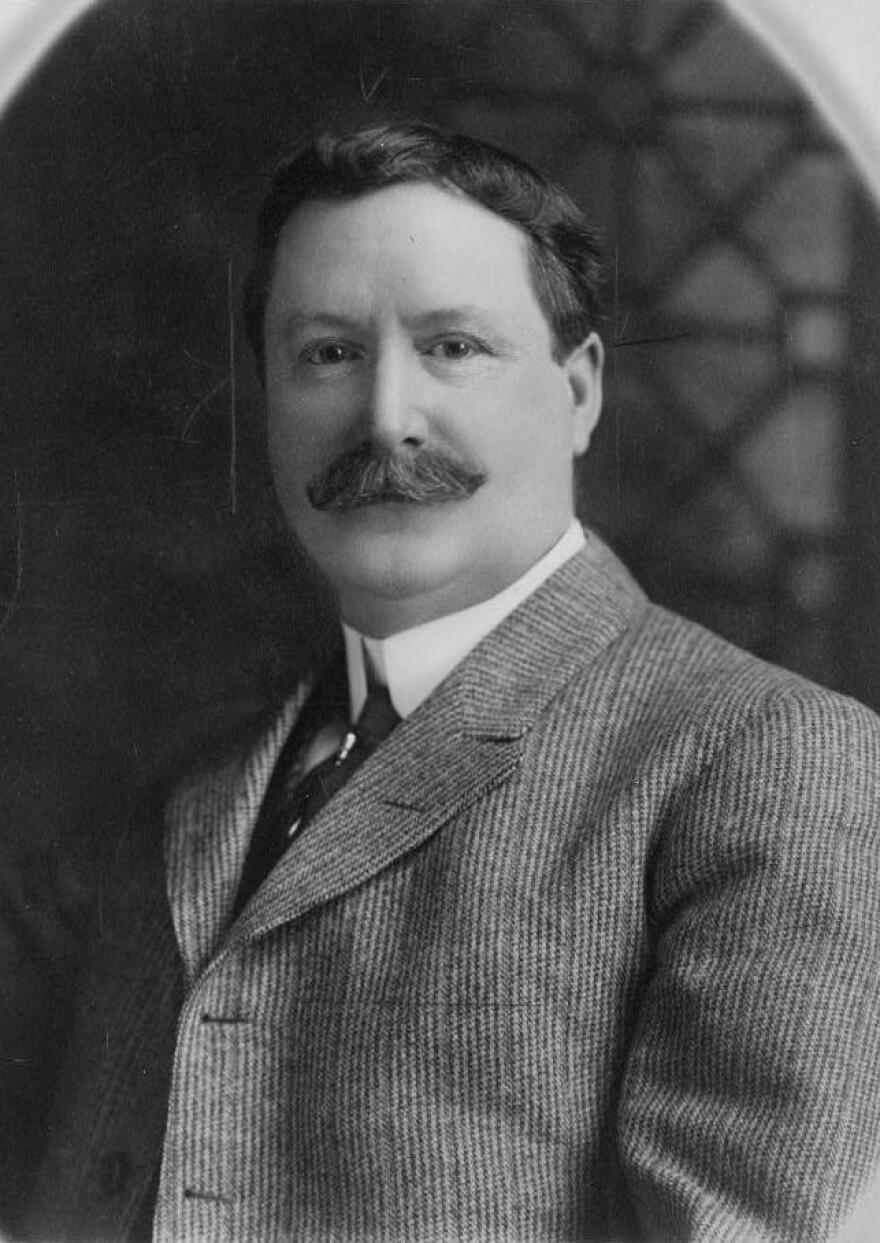When a Peoria millionaire began receiving malicious postcards in late 1913, a local law firm tapped one of the nation's greatest detective agencies began to investigate.
Dr. Vicky Loberg is author of the new book Peoria and America's Sherlock Holmes. Her research began when obtained a case file on the Thomas Webb case.
Let's start out first of all, right here on the cover. There's pictures of several different postcards, which are a very important part of this story. And there's also a business card for the William J. Burns National Detective Agency, based out of Chicago. Who was William J. Burns? He's America's Sherlock Holmes?
He is indeed. Now you have to understand that newspaper reporters over the years if there was a particularly successful detective in their hometown, the reporters would label America Sherlock Holmes or Chicago's Sherlock Holmes. But William J. Burns was labeled America's Sherlock Holmes by none other than Arthur Conan Doyle, the originator of Sherlock Holmes. They were friends, and they would travel back and forth and visit with each other. So Burns ended up eventually forming his own detective agency in Chicago, and he became quite well known in the area, and he competed actively with the most well known detective agency, that being the Pinkertons.
He became very well known for investigating a series of bombings in Los Angeles. And actually, there was in the early 1900s, a bombing here in Peoria, and Burns came to town and was able to determine that the materials used in that were related to the California bombing and such. So his name was already sort of known in town. And I think that's how his in his investigator and his operator came here and became involved in the Webb case.
We've mentioned Webb a few times here. Thomas Webb, quite a name here in Peoria. He was a very wealthy man. He had kind of a grandiose plan for a hotel in downtown Peoria at one point, so people knew definitely who Thomas Webb was in Peoria.
Absolutely. And one person said he was, when he died, the largest owner of real estate in the downtown Peoria area. And if he go through files in the (county) clerk's office, there are still multiple trusts that are involved with Webb. He was indeed, a great sportsman, racing yachts. He helped found the Illinois Valley Yacht Club, the IVY Club here. He owned a baseball team. He was in harness racing. And he liked fast cars also. And he also made this money that allowed him to own all this real estate as a scalper, initially. And we have a different idea of what a scalper is these days. But back in the 1800s, it was a very lucrative business. Folks would resell steamship and railroad tickets, and that's how I made his initial money. And he formed a bank which became Webb's bank or Webb's loan bank, essentially a pawn shop for diamonds. And then he accumulated that wealth and invested it in real estate.
And Webb got into, I guess, would we say, some trouble in Chicago around 1913 at the Hotel Sherman, if I remember correctly, right?
That's correct. And I merely report what was in the newspapers at the time, so I'm not attesting either to the negativity or the validity of the reports, but he reportedly invited a young woman from the Peoria area up to the Sherman hotel in in Chicago by telegram. And as she claimed, he had done this before, but this time she brought her mother with her he appeared to be a little chagrin. But he took both ladies to dinner. And then after dinner, they were going out the door and Webb took off running according to the newspaper report. And he literally ran into a Chicago policeman took him to the police station, because he had two women following him, supposedly screaming. And so he made bail and was released. But that's kind of the nexus of a lot of the story that led to this investigation by the William J. Burns Detective Agency.
And these threatening postcards started coming?
And they weren't merely threatening, they were malicious, they were vulgar, and some had many misspellings. And not long after, then that Webb went to his attorney's office. And then while reached out to the Burns agency, perhaps because he knew Burns had been here before with the case. So immediately, then after receiving contact, the manager of the Chicago office sent investigator number 72 to Peoria.
I know you don't want to give away the whole story here. But when the investigator gets to Peoria, what happens?
Well, he has to first meet to, obviously the primaries, Webb and Agnes Thewlis, who also worked for him at the bank, and while in the law office, and he looks through these postcards and he comes to the conclusion, well, it looks like a couple of them might be from the same person. And what's interesting as you go through all of the typed reports from the investigator and later the operator, it's a different era. Like, you find an unlocked door and you just go in and you help yourself.
We'll have to leave some of the suspense for people to actually get the book. But did they ever solve this case? Do we know who was doing it?
I have my suspicions. And I have my theories, but I'm interested in what people think after reading through all the evidence. I will say this, I'm not convinced that everything that happened with this case made its way into the legal file. I'm not sure all the characters involved went to the attorney and said that this is what happened or this is what I did. And I'll leave that for readers to decide.
Click here to email Loberg to learn more about the book.


